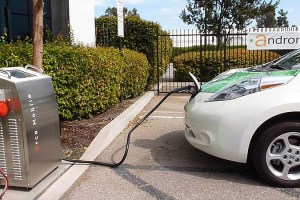Most of us are aware of the importance of our actions and their effects on the environment. Indeed, going green is now a watchword for individuals and companies alike. In terms of conspicuous consumption, one of the most flashy ways to show your eco-conscious actions is to purchase an electric car. There you are, driving along with your sustainable vehicle, coughing conspicuously at the exhaust of other, less environmentally friendly road users, laughing as they pay high fuel charges. If you’re imagining this scenario with glee, just remember that it’s not that simple.
Not Completely Green

Big Bend Power Station – a traditional coal-fired station.
Going electric isn’t a guarantee of green driving. Something to bear in mind is that while your car isn’t directly producing emissions, emissions are still happening somewhere along the production chain – most specifically in the generation of the electricity you use to drive your car. You can remedy this problem by seeking out a green-friendly energy provider, but keep the environmental costs of electricity production in mind.
Costs and Price Considerations
There’s some dispute over the exact cost differential of an electric car versus a combustion engine. Back in 2011, the DECC said that high fuel costs made an electric car cheaper than a combustion engine over 4 years. As reported in the Telegraph, the methodology here was slightly dodgy, comparing the electric vehicle with a petrol engine car, rather than some of the diesel’s that offer enhanced fuel economy. They also, importantly, assumed that the extra initial cost of the electric vehicle was dead money, rather than something that could be otherwise used or invested.
This leads to another issue which depends hugely on an individual’s life and preferences. Even in a case where over the life of the vehicle the total cost of ownership is definitely lower for an electric car, this still might not be worth it. Why? Because of the difference between money now and savings later. Something to be aware of in terms of total cost of ownership is when those savings are actually realised. While we all like to think that we’re long-term planners, short term concerns can’t be discounted. If buying a car in cash are the future benefits outweighed by less money changing hands today? If financing a vehicle, how do the interest payments weigh up against fuel cost savings?
Using and Driving

Then there’s the issues of usability. There are a number of considerations here – the need for down-time to charge your car’s battery, the difficulty in finding charging points (becoming less of an issue as time goes on, but still important) and the driving distance possible before needing to find a place to charge up or fuel up. While it is entirely possible to plan journeys and driving so as to always get the juice you need, it’s simply not as quick and easy as fuelling up at a petrol station.
Electric cars have their advantages, for example, less moving parts meaning less need for maintenance. However, it’s not fair to discount the serious concerns that many drivers have about their cost-effectiveness and performance. Choosing a hybrid may be an option, depending on which specific concerns are most important to you. Regardless of your decision, just make sure you’re well informed before you sign the contract. Blithely opting for petrol or diesel without considering electric or hybrid isn’t a good idea, but neither is jumping on the electric bandwagon without knowing what you’ll be in for. Real progress in the move to electric requires an honest appraisal of what works and doesn’t work, not just cheerleading.
Images via Stock Exchange, User Wknight94, User SunsetGreenLine.





 Facebook
Facebook Twitter
Twitter Instagram
Instagram LinkedIn
LinkedIn Youtube
Youtube